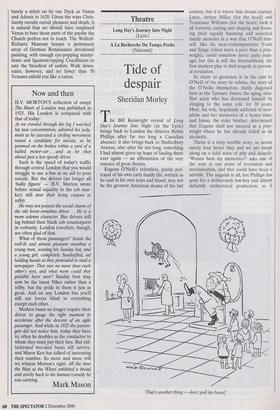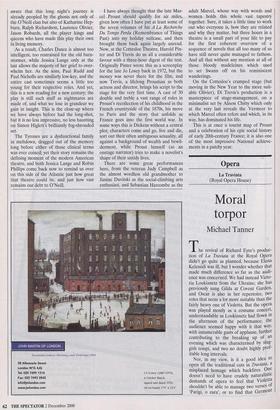Theatre
Long Day's Journey Into Night (Lyric) A La Recherche Du Temps Perdu (National)
Tide of despair
Sheridan Morley
The Bill Kenwright revival of Long Day's Journey Into Night (at the Lyric) brings back to London the director Robin Phillips after far too long a Canadian absence; it also brings back to Shaftesbury Avenue, also after far too long, something I had almost given up hope of finding there ever again — an affirmation of the very essence of great theatre.
Eugene O'Neill's relentless, poetic por- trayal of his own early family life, written as he said in his own tears and blood, may not be the greatest American drama of the last century, but it is where that drama started. Later, Arthur Miller (for the head) and Tennessee Williams (for the heart) took it all forward, cutting and shaping and focus- ing their equally haunting and scorched family memoirs in a way that O'Neill him- self, like his near-contemporaries Yeats and Synge (often more a poet than a play- wright), could somehow never quite man- age; but this is still the fountainhead, the first modern play to find tragedy in person- al revelation.
Its claim to greatness is in the cost to O'Neill of the story he relates, the story of the O'Neills themselves, thinly disguised here as the Tyrones; James, the aging, skin- flint actor who has destroyed himself by clinging to the same role for 30 years; Mary, his wife, hopelessly addicted to mor- phine and her memories of a better time; and Jamie, the elder brother, determined that Eugene shall not succeed as a play- wright where he has already failed as an alcoholic.
Theirs is a truly terrible story, as across nearly four hours they and we are swept along on a tidal wave of pity and despair; `Wanna hear my memories?' asks one of the sons at one point of revelation and recrimination, and that could have been a subtitle. The anguish is all, but Phillips has gone for a deliberately low-key and almost defiantly untheatrical production, as if aware that this long night's journey is already peopled by the ghosts not only of the O'Neill clan but also of Katharine Hep- burn, Ralph Richardson, Laurence Olivier, Jason Robards, all the player kings and queens who have made this play their own in living memory.
As a result, Charles Dance is almost too intelligent, too restrained for the old barn- stormer, while Jessica Lange only at the last allows the majesty of her grief to over- whelm her. As the sons, Paul Rudd and Paul Nicholls are similarly low-key, and the entire cast sometimes seems a little too young for their respective roles. And yet, this is a new reading for a new century; the play is still such stuff as nightmares are made of, and what we lose in grandeur we gain in insight. This is the close-up where we have always before had the long-shot, but it is no less impressive, no less haunting on Simon Higlett's brilliantly fog-shrouded set.
The Tyrones are a dysfunctional family in meltdown, dragged out of the memory long before either of those clinical terms was ever coined; yet their story remains the defining moment of the modern American theatre, and both Jessica Lange and Robin Phillips come back now to remind us over on this side of the Atlantic just how great that theatre could be, and just how vast remains our debt to O'Neill. I have always thought that the late Mar- cel Proust should qualify for air miles, given how often I have put at least some of the seven volumes of his A La Recherche Du Temps Perdu (Remembrance of Things Past) into my holiday suitcase, and then brought them back again largely unread. Now, at the Cottesloe Theatre, Harold Pin- ter and Di Trevis do us all a considerable favour with a three-hour digest of the text. Originally Pinter wrote this as a screenplay for the late Jo Losey back in 1972, but the money was never there for the film, and now Trevis, a lifelong Proustian as both actress and director, brings his script to the stage for the very first time. A cast of 30 double and treble a vast range of roles in Proust's recollection of his childhood in the French countryside of the 1870s, his move to Paris and the story that unfolds as France goes into the first world war. In some ways this is Dickens without a central plot; characters come and go, live and die, sort out their often ambiguous sexuality, all against a background of wealth and bewil- derment, while Proust himself (as an onstage narrator) tries to make a novelist's shape of their untidy lives.
There are some great performances here, from the veteran Judy Campbell as the almost wordless old grandmother to Janine Duvitski as the social-climbing arts enthusiast, and Sebastian Harcombe as the adult Marcel, whose way with words and women holds this whole vast tapestry together. Sure, it takes a little time to work out who everyone is, how they are related and why they matter, but three hours in a theatre is a small part of your life to pay for the first coherent overview of a sequence of novels that all too many of us have still never quite managed to fathom. And all that without any mention at all of those bloody madeleines which used to set Swami off on his reminiscent wanderings.
On the Cottesloe's cramped stage (but moving in the New Year to the more suit- able Olivier), Di Trevis's production is a masterpiece of stage-management, on a minimalist set by Alison Chitty which only at the very last reveals the Vermeer to which Marcel often refers and which, in its way, has dominated his life.
This is at once a tourist map of Proust and a celebration of his epic social history of early 20th-century France; it is also one of the most impressive National achieve- ments in a patchy year.



















































































 Previous page
Previous page